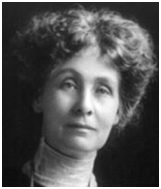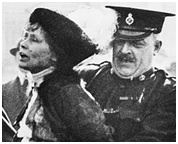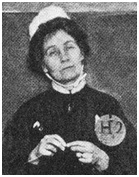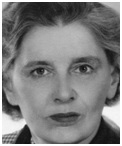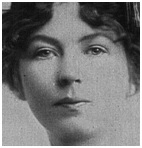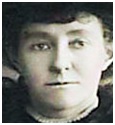|
 |
|
 |
|
|
||
Emmeline Pankhurst - Suffragettes and Leadership
Emmeline Pankhurst (1858-1928)
English suffragette (pictured right), who led the militant campaign to win the vote for British women. Those over 30 eventually got it in 1918, extended to the over 21’s in 1928, the same as for men.
For more information about the suffragettes... See Emily Davison's Death at the Derby in the History Highlights section.
Why was she successful and a great leader? 1. Purpose and vision Pankhurst (pictured right being arrested in 1914):
She told a court in 1912: “We are here, not because we are lawbreakers; we are here in our efforts to become lawmakers”. 2. Courage and determination Pankhurst (pictured in prison) and her fellow suffragettes were very brave In prison they:
The controversial Cat and Mouse Act allowed the release and then re-arrest of hunger strikers, so they wouldn’t die. In 1912 alone, Pankhurst went to prison 12 times. 3. Communication and charisma She inspired people with her charisma and great speeches. When she spoke, a fellow suffragette and writer, Rebecca West (pictured right), said she was “trembling like a reed” but the reed was “of steel and it was tremendous”.
4. Brilliant organizer and tactician She set up the Women’s Social and Political Union (WSPU) in 1903, helped by her daughters, Christabel (pictured right) and Sylvia, and many other dedicated women. Their campaigns certainly brought the suffragette cause great publicity, particularly Emily Davison’s (pictured right below) tragic death at the 1913 Derby. More controversial is the effectiveness of her violent tactics (arson, window smashing and picture
slashing). She ended her campaign, when the First World War began in 1914 Some historians argue that women’s involvement in the war did more to win their vote than the suffragettes.
5. Dignity and integrity Despite the fierce opposition of the government, she was always true to the principle of defending women’s rights as voters and human beings.
6. Benign dictatorship She was autocratic but she gave her followers a choice about which militant acts to use. Her dictatorial leadership gave the suffragette movement unity and decisive direction, which:
7. Family She was heavily influenced by the radical views of her:
His death in 1898 left her devastated and without money to bring up her four children including Christabel and Sylvia (pictured right below). But her determination turned her grief into success.
Key quotes on women We are here, not because we are lawbreakers; we are here in our efforts to become lawmakers As long as women consent to be utterly governed, they will be. How different the reasoning is that men adopt when they are discussing the cases of men and those of women. Men make the moral code and they expect women to accept it. The argument of the broken pane of glass is the most valuable argument in modern politics. |
|
|
||
|
|
||
| Copyright © wisdomtowin.com 2025 All Rights Reserved | ||
|


